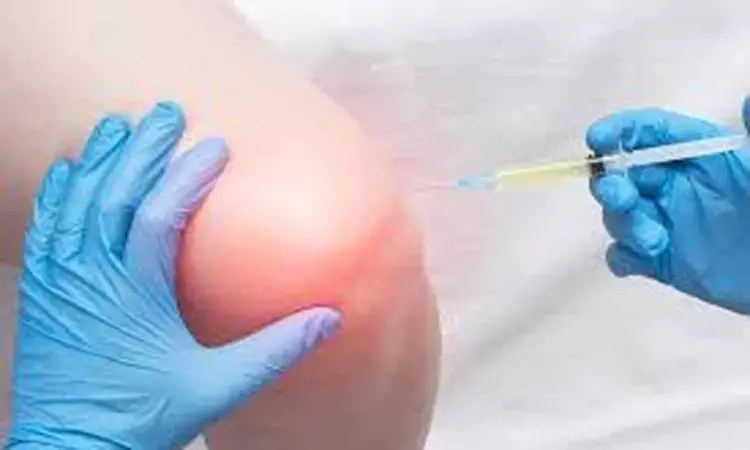- Home
- Medical news & Guidelines
- Anesthesiology
- Cardiology and CTVS
- Critical Care
- Dentistry
- Dermatology
- Diabetes and Endocrinology
- ENT
- Gastroenterology
- Medicine
- Nephrology
- Neurology
- Obstretics-Gynaecology
- Oncology
- Ophthalmology
- Orthopaedics
- Pediatrics-Neonatology
- Psychiatry
- Pulmonology
- Radiology
- Surgery
- Urology
- Laboratory Medicine
- Diet
- Nursing
- Paramedical
- Physiotherapy
- Health news
- Fact Check
- Bone Health Fact Check
- Brain Health Fact Check
- Cancer Related Fact Check
- Child Care Fact Check
- Dental and oral health fact check
- Diabetes and metabolic health fact check
- Diet and Nutrition Fact Check
- Eye and ENT Care Fact Check
- Fitness fact check
- Gut health fact check
- Heart health fact check
- Kidney health fact check
- Medical education fact check
- Men's health fact check
- Respiratory fact check
- Skin and hair care fact check
- Vaccine and Immunization fact check
- Women's health fact check
- AYUSH
- State News
- Andaman and Nicobar Islands
- Andhra Pradesh
- Arunachal Pradesh
- Assam
- Bihar
- Chandigarh
- Chattisgarh
- Dadra and Nagar Haveli
- Daman and Diu
- Delhi
- Goa
- Gujarat
- Haryana
- Himachal Pradesh
- Jammu & Kashmir
- Jharkhand
- Karnataka
- Kerala
- Ladakh
- Lakshadweep
- Madhya Pradesh
- Maharashtra
- Manipur
- Meghalaya
- Mizoram
- Nagaland
- Odisha
- Puducherry
- Punjab
- Rajasthan
- Sikkim
- Tamil Nadu
- Telangana
- Tripura
- Uttar Pradesh
- Uttrakhand
- West Bengal
- Medical Education
- Industry
Physical Therapy bests Glucocorticoid Injection in Knee Osteoarthritis

Researchers have found in a new study that Physical therapy was better than intra articular Glucocorticoid Injection in patients of knee osteoarthritis.
Both physical therapy and intraarticular injections of glucocorticoids have been shown to confer clinical benefit with respect to osteoarthritis of the knee. Whether the short-term and long-term effectiveness for relieving pain and improving physical function differ between these two therapies is uncertain.
The researchers conducted a randomized trial to compare physical therapy with glucocorticoid injection in the primary care setting in the U.S. Military Health System. Patients with osteoarthritis in one or both knees were randomly assigned in a 1:1 ratio to receive a glucocorticoid injection or to undergo physical therapy. The primary outcome was the total score on the Western Ontario and McMaster Universities Osteoarthritis Index (WOMAC) at 1 year (scores range from 0 to 240, with higher scores indicating worse pain, function, and stiffness). The secondary outcomes were the time needed to complete the Alternate Step Test, the time needed to complete the Timed Up and Go test, and the score on the Global Rating of Change scale, all assessed at 1 year.
They enrolled 156 patients with a mean age of 56 years; 78 patients were assigned to each group. Baseline characteristics, including severity of pain and level of disability, were similar in the two groups. The mean (±SD) baseline WOMAC scores were 108.8±47.1 in the glucocorticoid injection group and 107.1±42.4 in the physical therapy group. At 1 year, the mean scores were 55.8±53.8 and 37.0±30.7, respectively (mean between-group difference, 18.8 points; 95% confidence interval, 5.0 to 32.6), a finding favoring physical therapy. Changes in secondary outcomes were in the same direction as those of the primary outcome. One patient fainted while receiving a glucocorticoid injection.
The researchers concluded that patients with osteoarthritis of the knee who underwent physical therapy had less pain and functional disability at 1 year than patients who received an intraarticular glucocorticoid injection. (ClinicalTrials.gov number, NCT01427153. opens in new tab.)
For more details click on the link: DOI: 10.1056/NEJMoa1905877
Hina Zahid Joined Medical Dialogue in 2017 with a passion to work as a Reporter. She coordinates with various national and international journals and association and covers all the stories related to Medical guidelines, Medical Journals, rare medical surgeries as well as all the updates in the medical field. Email: editorial@medicaldialogues.in. Contact no. 011-43720751
Dr Kamal Kant Kohli-MBBS, DTCD- a chest specialist with more than 30 years of practice and a flair for writing clinical articles, Dr Kamal Kant Kohli joined Medical Dialogues as a Chief Editor of Medical News. Besides writing articles, as an editor, he proofreads and verifies all the medical content published on Medical Dialogues including those coming from journals, studies,medical conferences,guidelines etc. Email: drkohli@medicaldialogues.in. Contact no. 011-43720751


